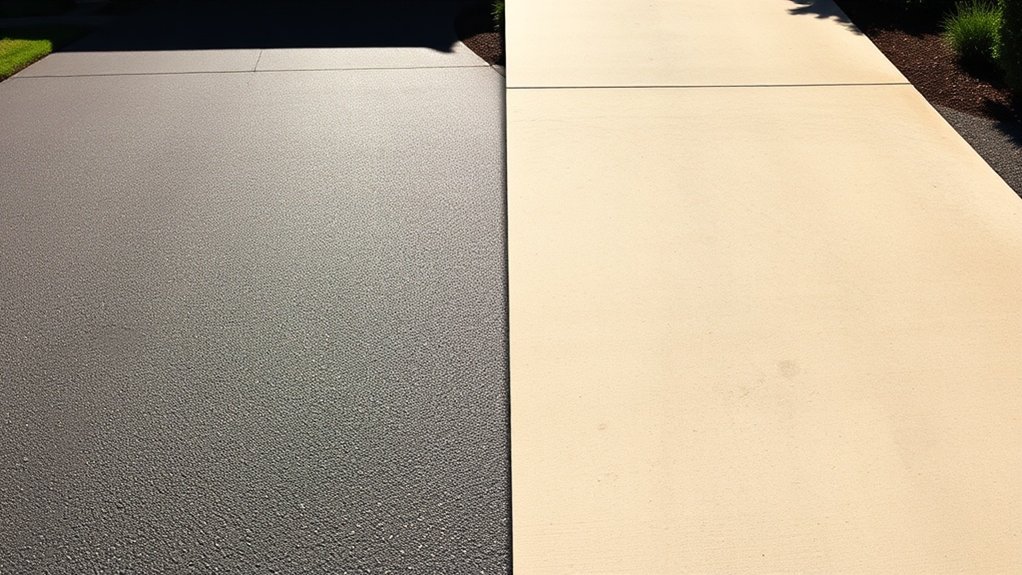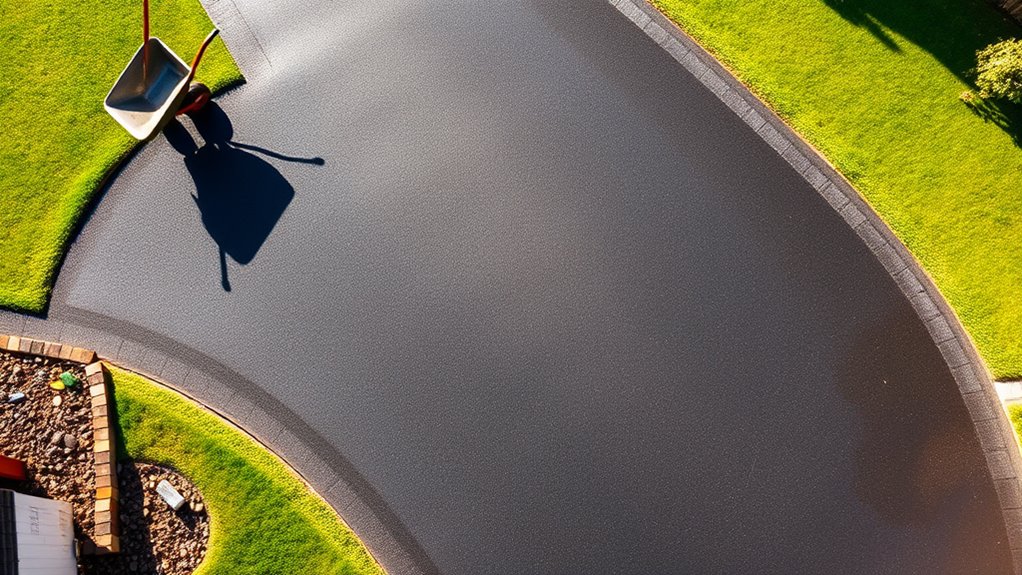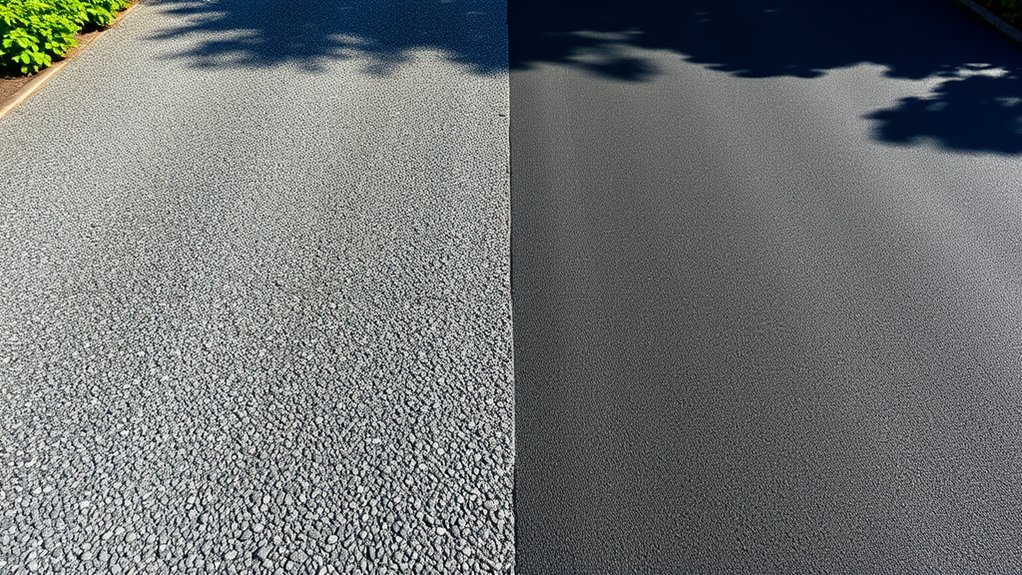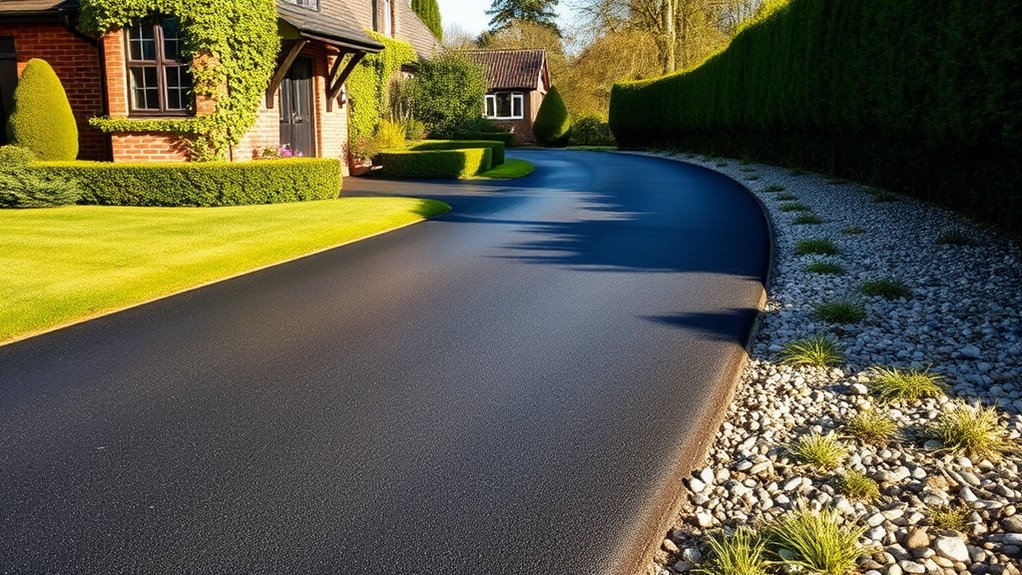For the best resistance to UV rays, polyaspartic and aliphatic polyurethane resins are top choices for driveway materials. These options resist discolouration and maintain their structural integrity, far exceeding the performance of traditional asphalt and concrete. While asphalt may fade and need regular maintenance, UV-stable materials can last for decades with little upkeep. Choosing these materials not only boosts durability but also keeps your driveway looking fresh. There’s plenty of information available on maintenance practices and material options.
Table of Contents
ToggleKey Takeaways
- Aliphatic polyurethane and polyaspartic coatings provide excellent UV resistance, preventing fading and deterioration caused by sunlight.
- UV-stable materials, like DALTEX aggregates, retain their colour and structure over time, unlike non-UV-stable alternatives.
- Asphalt and standard concrete are vulnerable to UV damage, resulting in fading, cracking, and a shorter lifespan.
- Sealed concrete can improve UV stability, enhancing both durability and appearance when exposed to sunlight.
- While investing in UV-resistant materials may involve higher upfront costs, it can lead to significant savings on maintenance in the long run.
Understanding UV Stability in Driveway Materials
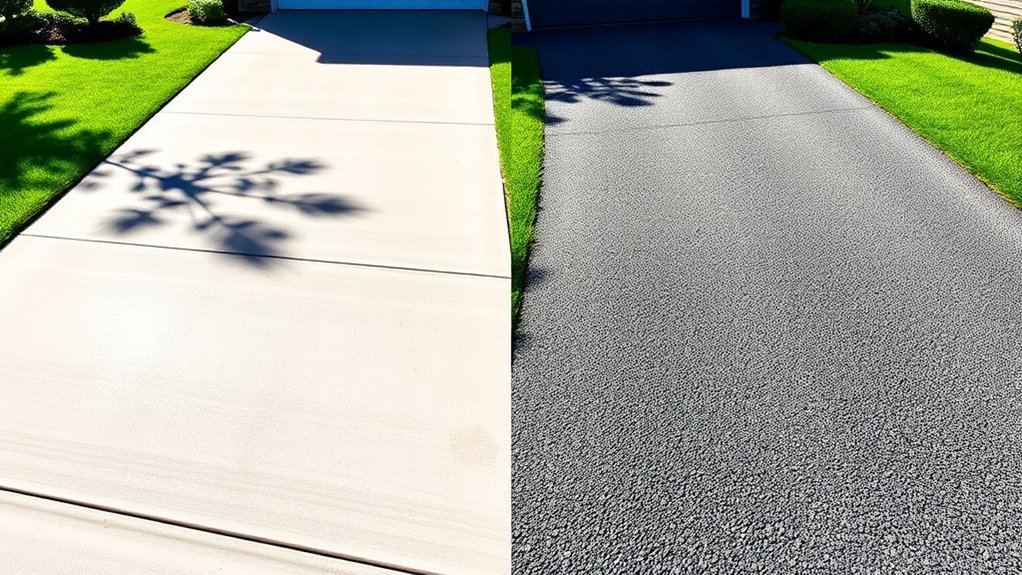
How well do your driveway materials withstand UV rays? The UV stability of driveway materials depends largely on the type of resin used. Aliphatic polyurethane resins are excellent at resisting UV degradation, keeping their colour and appearance intact over time. In contrast, aromatic polyurethane resins tend to yellow and discolour when exposed to sunlight. Polyaspartic coatings offer the best UV stability, ensuring long-lasting vibrancy. On the other hand, epoxy coatings often yellow and become brittle unless they’re protected with UV-stable topcoats. Materials like asphalt and concrete lack UV stability, which can lead to visible surface damage and a decline in appearance, making UV-stable resin an ideal choice for maintaining driveway aesthetics. Additionally, opting for resin-bound driveways can provide enhanced durability and resistance to environmental factors, further preserving appearance and functionality.
Comparison of UV-Stable and Non-UV-Stable Materials
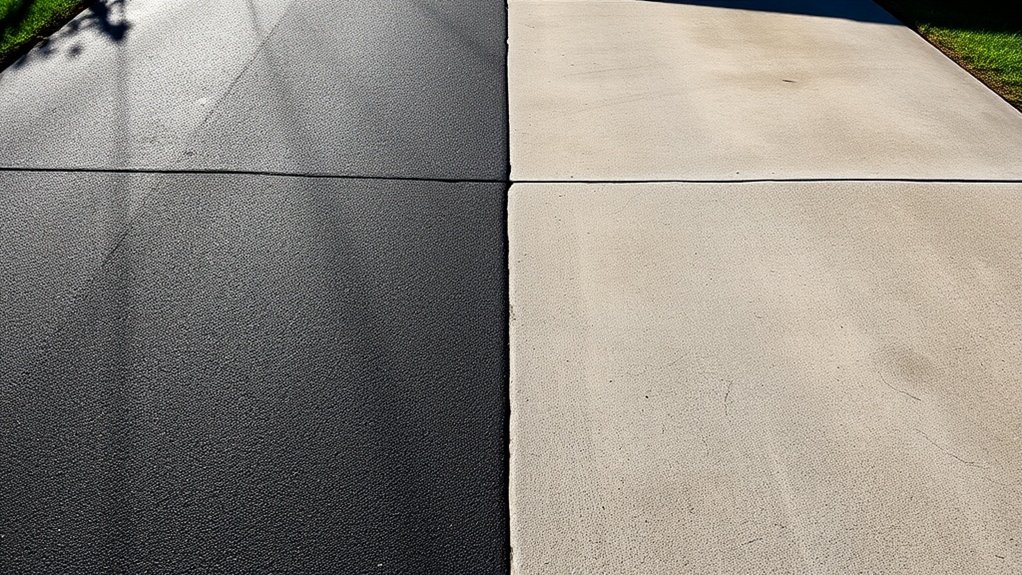
When comparing UV-stable and non-UV-stable driveway materials, there are clear differences in their long-term performance. UV-stable options, such as permeable plastic pavers and sealed concrete, resist degradation and maintain their structure when exposed to sunlight. Additionally, choosing materials with proper drainage design can further enhance their longevity and performance against UV rays. DALTEX aggregates are an excellent example of UV-stable resin technology that prevents fading and discolouration. On the other hand, non-UV-stable materials, like asphalt and certain rubber pavers, can soften, crack, and discolour over time, leading to more frequent maintenance.
UV Stability Overview
UV stability is essential when choosing materials for your driveway, as it affects how well they withstand prolonged sun exposure without deteriorating.
Knowing the difference between UV-stable and non-UV-stable materials can help you make a smarter choice. Here’s what to consider:
- UV Degradation: Non-UV-stable materials can fade and become brittle from UV exposure, leading to a worn appearance over time.
- Material Formulations: UV-stable options utilise advanced resin compositions that resist discolouration and maintain their strength. This ensures that structural integrity is preserved over time, enhancing the overall durability of your driveway.
- Maintenance Requirements: You’ll find that UV-stable materials need significantly less maintenance, saving you both time and money in the long run.
Long-Term Performance Comparison
When choosing materials for your driveway, it’s crucial to understand the long-term performance differences between UV-stable and non-UV-stable options.
UV-stable resins are made with light-resistant polymers, providing better durability and colour retention for up to twenty-five years. In contrast, non-UV-stable resins can yellow and become brittle, leading to a shorter lifespan and more frequent repairs.
Asphalt may fade over time, yet it remains durable, while concrete needs UV-stable topcoats to avoid deterioration. Additionally, selecting UV-resistant resins is essential for maintaining the vibrancy of your driveway over time.
Although UV-stable options often come with higher upfront costs, they can save you money in the long run due to reduced maintenance needs.
Benefits of UV-Stable Driveway Options
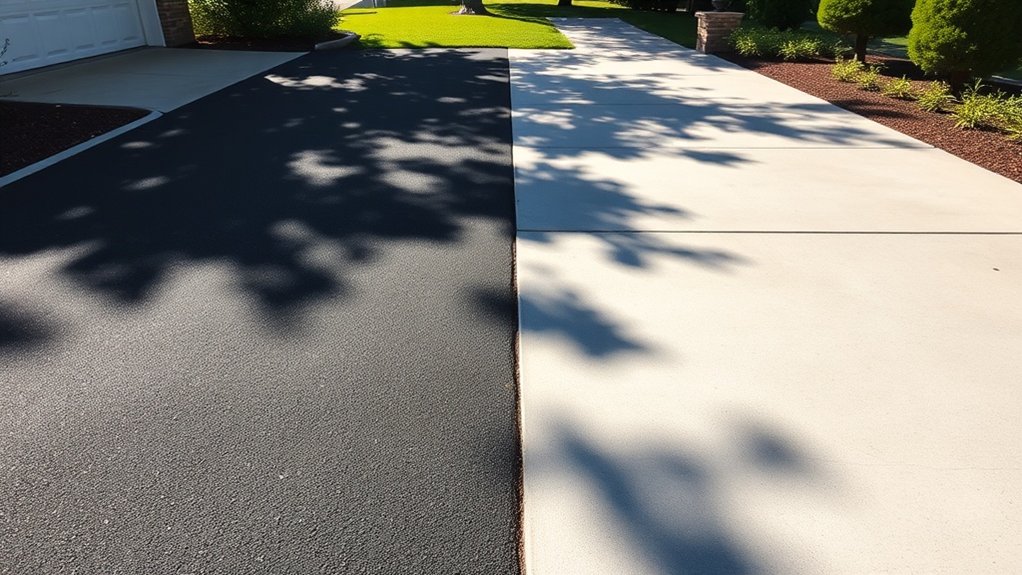
Choosing driveway materials that resist UV rays not only boosts durability but also cuts down on maintenance.
Here are some key benefits of investing in UV-stable options:
- Durability: These materials can handle sun exposure without breaking down, which means they last longer.
- Aesthetic Longevity: UV-resistant surfaces keep their colour and texture over time, so your driveway will look great for years.
- Sustainability: Many UV-stable materials are made from recycled content, helping to reduce waste and lessen environmental impact.
Drawbacks of Non-UV-Stable Driveway Materials
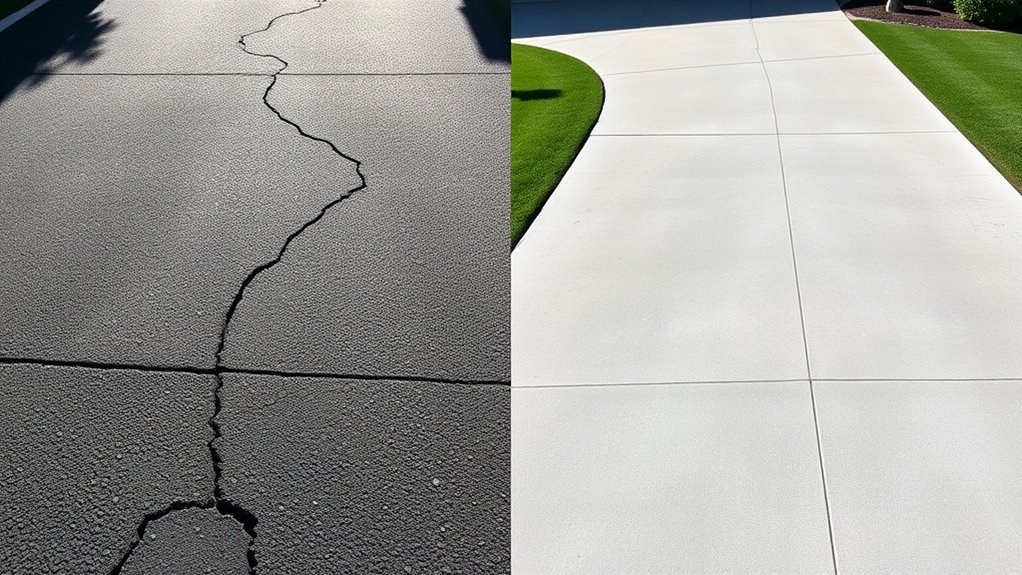
Choosing non-UV-stable driveway materials can lead to quicker surface deterioration, resulting in cracks and brittleness.
This not only reduces the lifespan of your driveway but also raises maintenance costs due to the need for more frequent repairs and cleaning.
In the long run, these issues can significantly affect both the appearance and functionality of your property.
Accelerated Surface Degradation
While driveway materials may seem sturdy, non-UV-stable options face rapid deterioration when exposed to sunlight. This breakdown can lead to various problems:
- Prolonged UV exposure can quickly degrade resins, affecting both the look and functionality of your driveway.
- In asphalt, the bitumen can form a water-soluble layer, which increases the risk of erosion and further damage.
- The most significant degradation occurs within the first 2–3 years, particularly affecting the surface layers.
When considering your driveway options, remember that this accelerated wear not only reduces visual appeal but also indicates possible structural weaknesses.
Opting for UV-stable materials can significantly prolong your driveway’s lifespan, protecting it from these harmful effects and ensuring better overall performance.
Increased Maintenance Costs
As non-UV-stable driveway materials break down in prolonged sunlight, you can expect rising maintenance costs that could stretch your budget over time.
For instance, asphalt typically requires resealing every 2-3 years, costing between £5 and £20 per square metre, while gravel needs regular replenishment and grading, which can add significant labour costs.
This cycle of frequent repairs not only increases your maintenance efforts but also accumulates expenses quickly.
Additionally, concrete is prone to cracking, requiring more frequent crack filling (about £8-£15 per linear metre) and resurfacing (£15-£30 per square metre).
Ultimately, the ongoing costs associated with non-UV-stable materials can lead to early replacements, further straining your finances and affecting your overall budget.
Maintenance Practices for UV Resistance
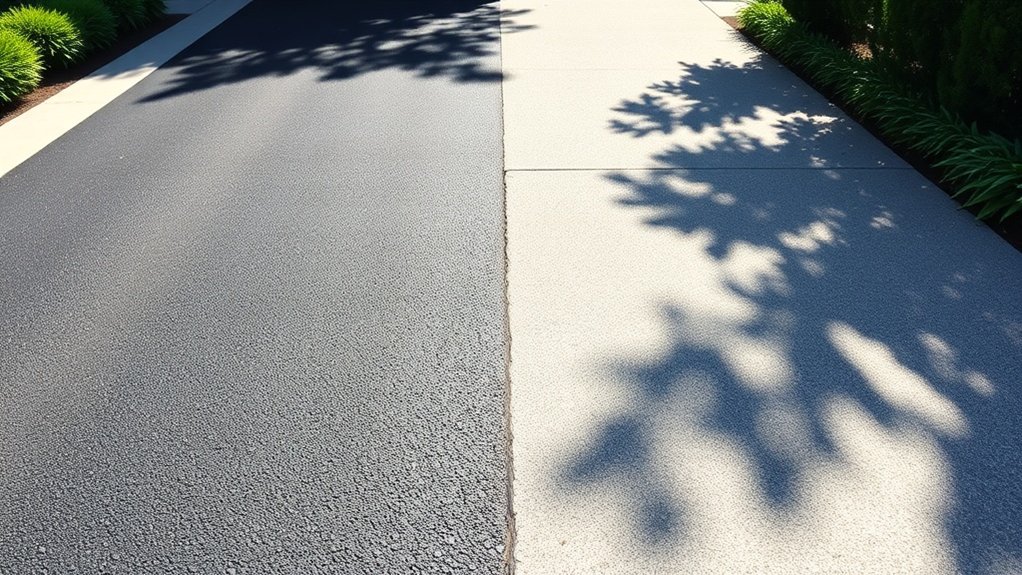
To ensure your driveway remains resistant to UV rays and retains its integrity, a consistent maintenance routine is crucial. Here are some key practices to follow:
- Sealant Selection: Opt for UV-resistant sealants that suit your driveway material. Reflective coatings can offer added protection.
- Maintenance Frequency: Apply sealant every 2-3 years for asphalt and every 3-5 years for concrete, or annually if you live in an area with harsh weather.
- Regular Inspections: Check for cracks each month and fill them promptly. This will help prevent water damage and UV deterioration.
Keep the surface clean by sweeping away debris and power washing it seasonally.
Ensure proper drainage and moisture control to limit UV-related wear.
Factors Affecting UV Resistance in Driveway Choices
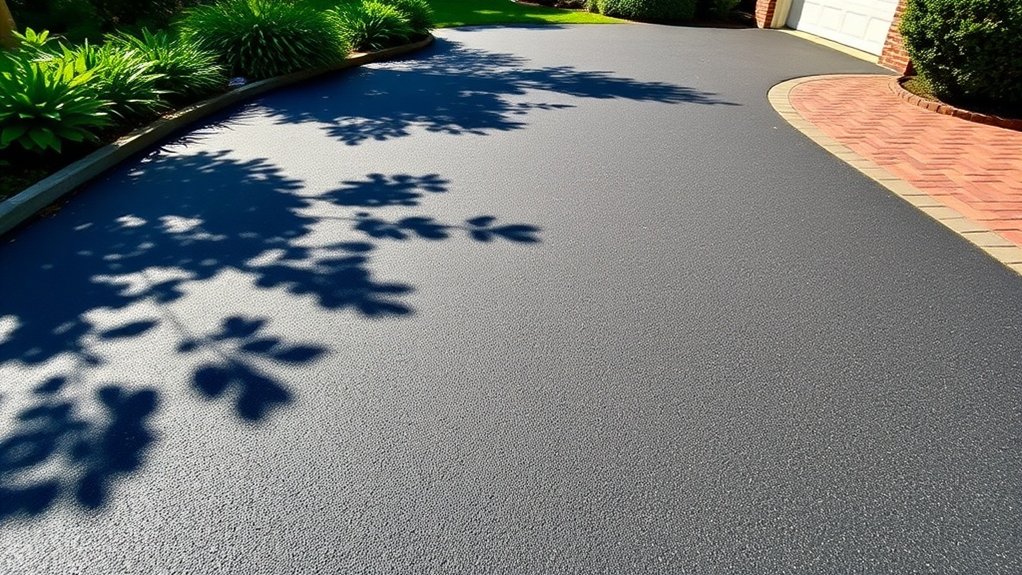
When choosing driveway materials, it’s important to understand what affects UV resistance for lasting durability and appearance.
Start with the material composition; UV-stable options use light-resistant polymers that reduce wear over time.
Next, look at colour stability; UV-resistant resins keep their colour, preventing unwanted fading.
Surface durability is also key, as UV-resistant materials are less likely to crack or become brittle.
Consider the environmental impact too; materials with good UV resistance can better handle harsh sunlight and changing weather.
While UV-stable choices might cost more upfront, they can save you money in the long run due to lower maintenance needs.
Frequently Asked Questions
How Do UV Rays Affect Driveway Aesthetics Over Time?
UV rays cause driveways to fade and discolour over time, leading to asphalt turning grey and traditional coatings yellowing. Opting for UV-stable materials can significantly reduce these aesthetic issues, helping to maintain your driveway’s appearance for longer.
Can Uv-Stable Materials Be Used in Shaded Areas?
“Out of sight, out of mind.” UV-stable materials are ideal for shaded driveways, as they maintain their quality even with less sunlight. Their durability prevents degradation and minimises moisture retention, ensuring reliable performance. For instance, using UV-stable paving stones in a shaded area can help keep your driveway looking good while standing the test of time.
What Is the Cost Difference Between Uv-Stable and Non-Uv-Stable Materials?
When analysing the costs of driveway materials, UV-stable options generally come with an initial price increase of 10% to 30% compared to non-UV-stable alternatives. However, the long-term savings on maintenance and repairs often make this investment worthwhile. For instance, while you might pay more upfront for UV-stable materials, they are less likely to fade or crack over time, reducing the need for costly repairs.
Are There Eco-Friendly Uv-Stable Driveway Options Available?
Yes, there are eco-friendly UV-stable driveway options available in the UK. Examples include recycled rubber pavers, PaveCore systems, and natural stone. These sustainable materials offer durability while minimising environmental impact, making them excellent choices for long-lasting driveways.
How Does UV Resistance Impact Driveway Warranties?
UV resistance significantly influences warranty coverage, as more durable materials generally come with longer warranties, indicating their longevity. By opting for UV-stable choices, you can ensure better protection against wear and tear, leading to lower maintenance costs over time. For instance, a driveway made from UV-resistant materials will be less likely to fade or crack under the sun, resulting in a longer-lasting surface.
Conclusion
In conclusion, not all driveway materials offer the same level of resistance to UV rays. Options such as concrete and specific types of pavers are more UV-stable, providing better durability and less fading over time. Choosing the right material not only improves your property’s appearance but also helps cut down on future maintenance costs. So, when selecting your driveway material, make UV resistance a priority—your investment will pay off in the long run.
How can a tarmac driveway enhance your home's appeal? Discover the key aspects of cost, installation, and maintenance in our Read more
Beneath the surface of tarmac and asphalt driveways lies a world of differences; discover which option suits your needs best.
Wondering if a tarmac driveway is the perfect fit for your home? Uncover the essential pros and cons before making Read more

